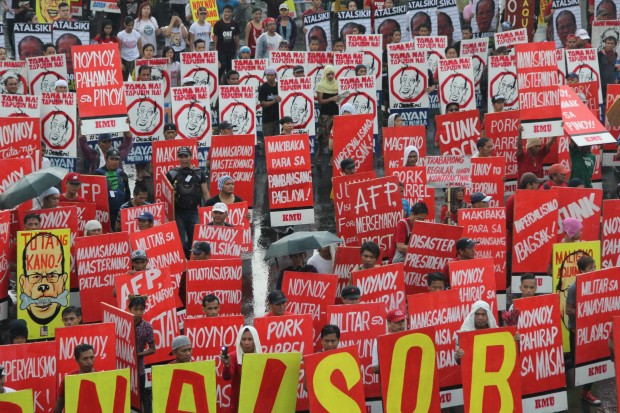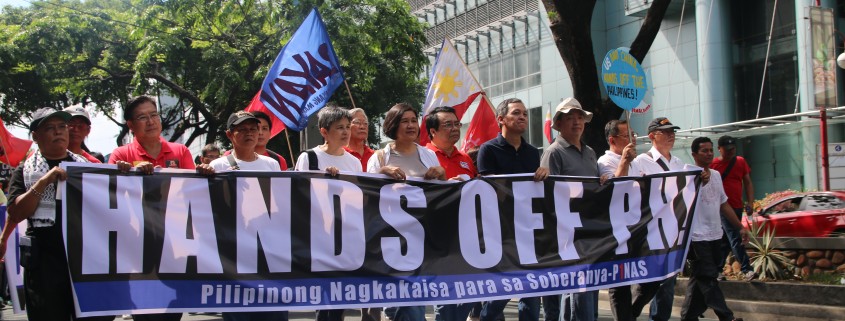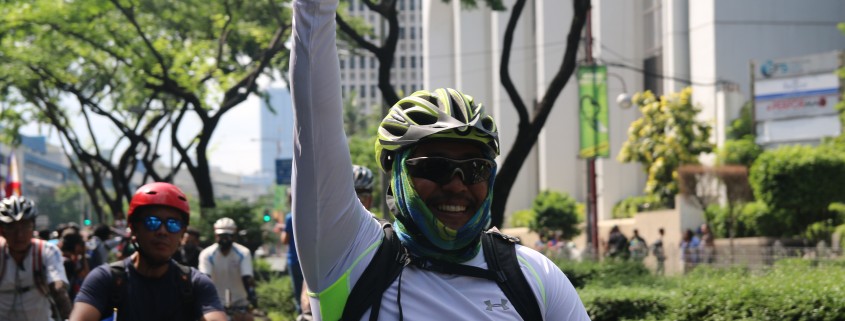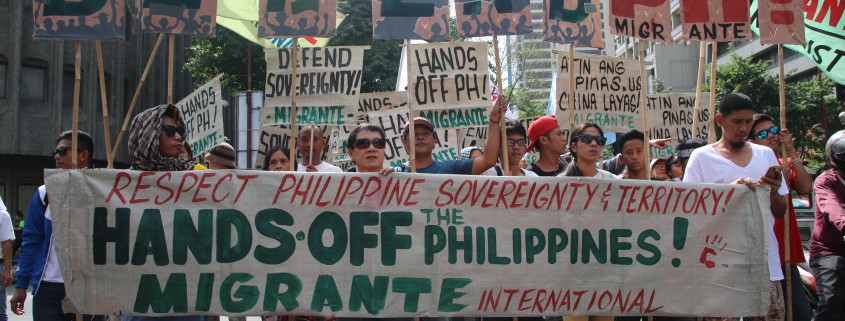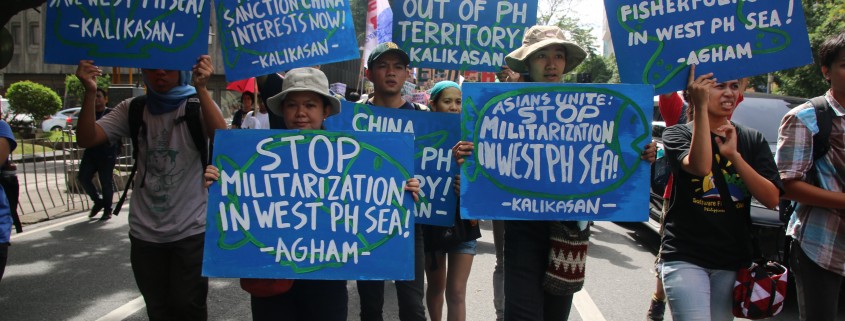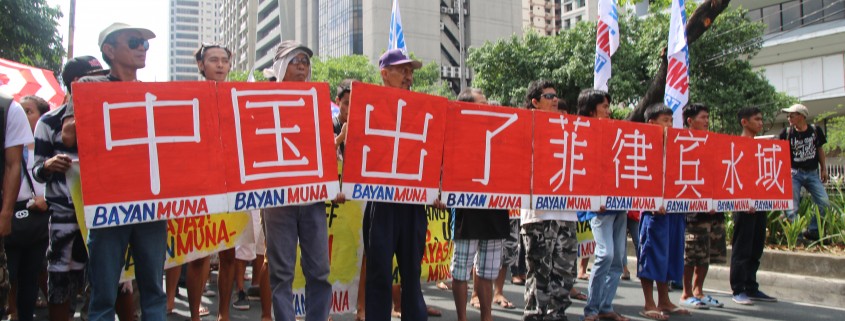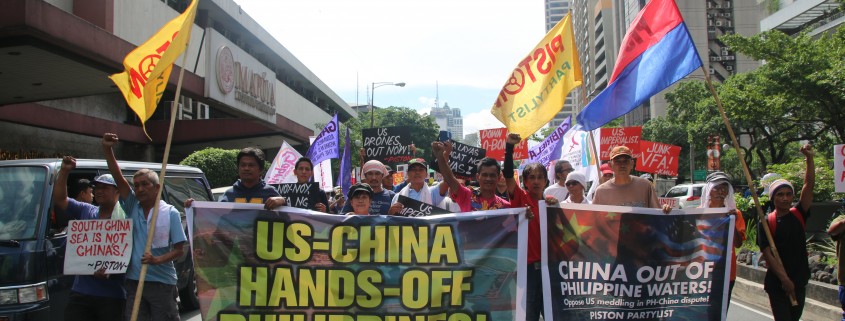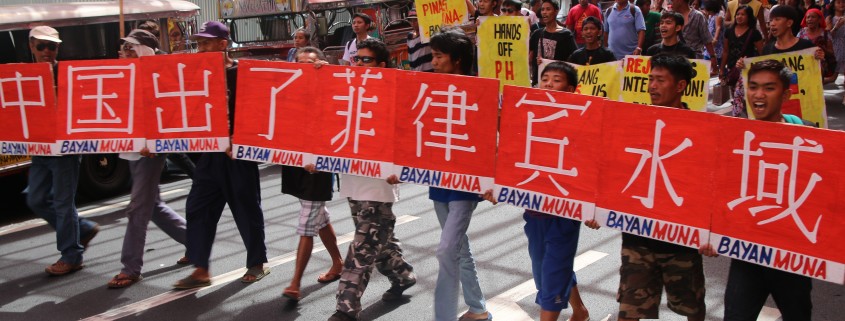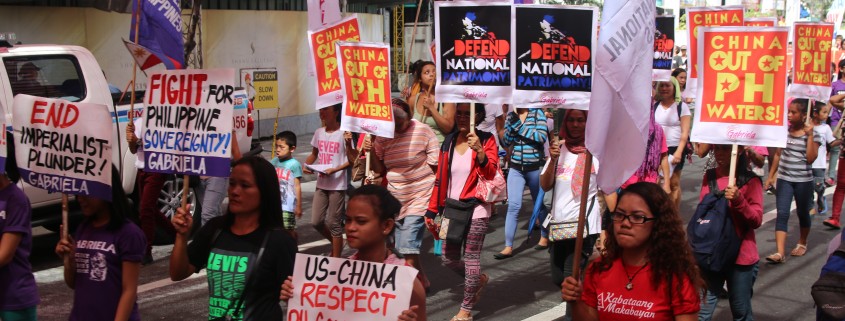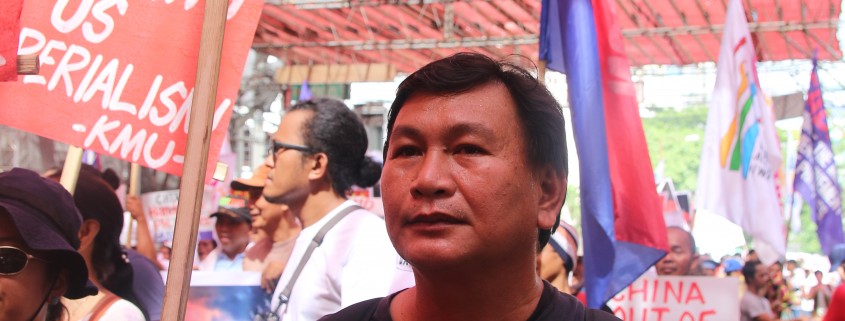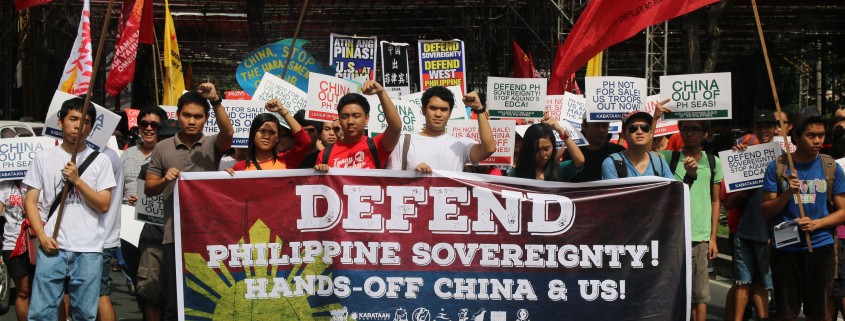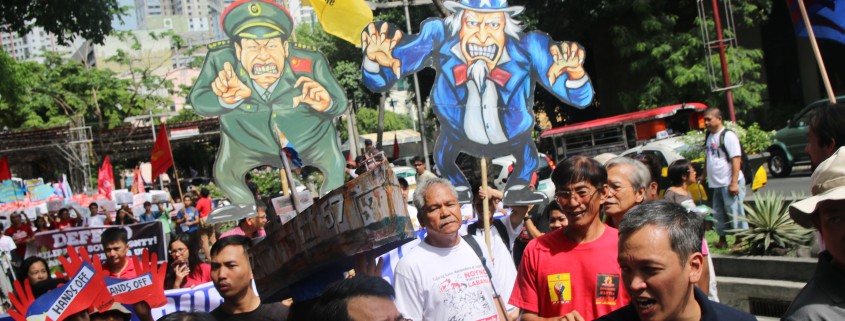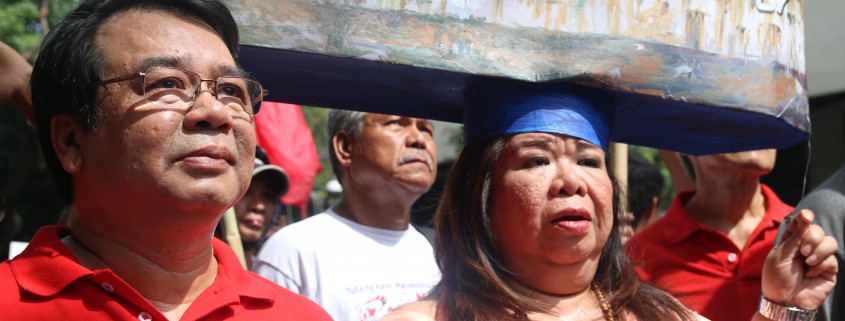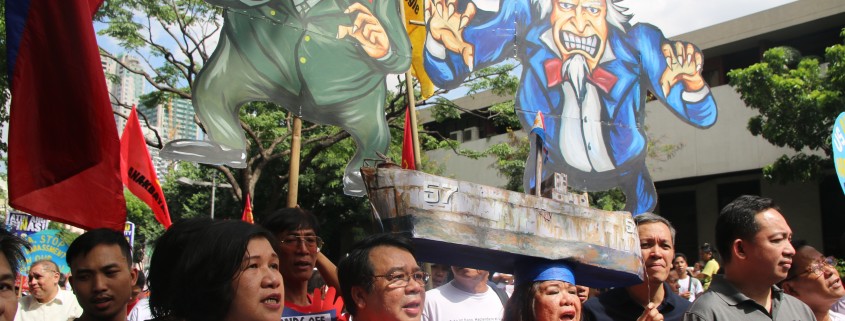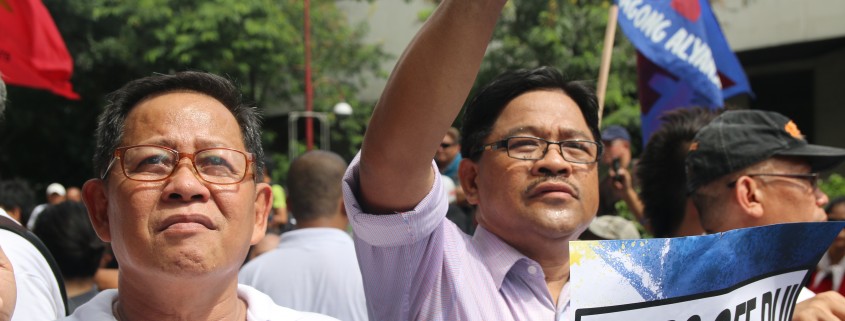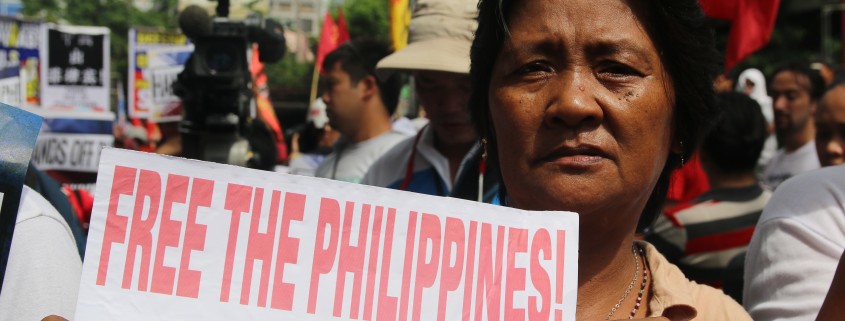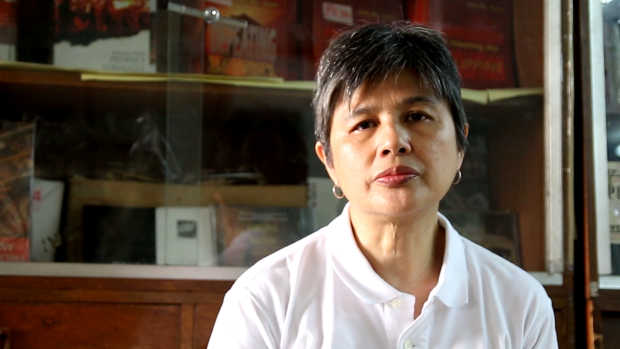Streetwise: Aquino’s SONA, what legacy? By Carol Pagaduan-Araullo
This year’s state-of-the-nation address (SONA) is President BS Aquino’s last. He is expected to deliver a powerful speech replete with his regime’s achievements for the last 5 years with a summation of the legacy he will leave behind as he winds up his term. The Palace is agog about the Aquino regime’s so-called “legacy of reforms”. Speculation is rife, less than a year before the 2016 presidential elections (no doubt stoked by the “yellow” media to dispel the fact of a lame duck president with not much political capital remaining) about who will be his “anointed” to “continue the legacy”.
But the smoke-and-mirrors presidency that this column described upon its inauguration in 2010 has run out of magic tricks especially when it has to make something big out of basically nothing much. All the catchy, folksy slogans, in Filipino even, have boomeranged because they have been unmasked as empty or false and merely calculated to deceive and disarm.
The hard sell is that the Aquino presidency is qualitatively different, especially from the one that preceded it, that of Gloria Macapagal-Arroyo. Former president Arroyo is the proverbial whipping girl as far as Mr. Aquino and his coterie are concerned, for all things wrong in government before Mr. Aquino, an erstwhile non-performer in Congress, arrived on the political scene.
But unlike the Arroyo regime that at least saw the successful prosecution and conviction for plunder of Mrs. Arroyo’s predecessor, Joseph “Erap” Estrada, the cases against GMA have either been set aside, dismissed or are languishing in judicial limbo. The student activists have a term for it: Mr. Aquino has been “Noynoying”, content with keeping GMA under hospital arrest and somewhat constrained from plotting against him, the ends of justice be hanged.
In reality Aquino’s campaign for good governance against abuse of authority, corruption, obstructionism and incompetence have been exposed as mere demagoguery, tokenism, selective prosecution of those in the anti-Aquino Opposition, and sometimes petty vindictiveness sparing the truly accountable from among the “kabarkada, kaklase, kabarilan”. Police General Alan Purisima, Local Government Undersecretary Rico Puno, Agriculture Secretary Proceso Alcala, LTO Assistant Secretary Virginia Torres, Budget Secretary Butch Abad and Presidential Peace Adviser Ging Deles come to mind.
The Malacanang propaganda line is that the Aquino regime made a real difference to the hardscrabble lives of the majority of Filipinos. But the reality is more entrenched poverty and economic backwardness; unprecedented inequality marked by healthy profitmaking for multinational corporations and the local elite; untouched feudal relations in the countryside; auctioning of the national patrimony and unabated environmental destruction. This in the midst of impressive growth rates, credit-rating upgrades, and high scores in “competitiveness” by foreign and local big business and the World Bank. (For a more comprehensive analysis see “SONA 2015: A Legacy of a Disconnected Economy” http://ibon.org/ibon_features.
The illusion that the Aquino regime has been trying to conjure is that it has championed national sovereignty and defended territorial integrity pointing to the government’s filing of a case in a UN arbitral tribunal and appeals for support in other international venues with regard to the heated West Philippine Sea dispute with China over maritime rights and territory.
The Aquino government’s acquiescence to the lop-sided Enhanced Defense Cooperation Agreement (EDCA) on top of the obsequious implementation of the Visiting Forces Agreement (VFA) and the Mutual Defense Treaty (MDT) in order to allow the permanent stationing of troops and war materiel and unhampered operations by the US military on Philippine territory (nothing less than the return of US military bases as part of the US “pivot” to the Asia Pacific region) is covered-up as a necessary adjunct to building a “credible external defense”.
The abject lack of an independent foreign policy — in the process placing the country in the crosshairs of the actual and potential enemies of the lone Superpower — is passed off as pragmatism, or worse, an alignment of national interests. The latter has historically been proven as completely false: from the devastation of World War II brought on by being the lone US colony in the region; to the economic losses, social degradation and political costs of hosting the two biggest US bases outside the US mainland; and to the decrepit and weak state of the Armed Forces of the Philippines under US tutelage — with its long-standing orientation towards counterinsurgency rather than national defense and its hand-me-down equipment purchased at supposed discounts according to the terms of lopsided military assistance pacts.
The big picture moreover shows the surrender of economic sovereignty to the international financial institutions dominated by the US, EU and other advanced capitalist countries, to their governments especially the US, and to the powerful lobby of foreign chambers of commerce in favor of neoliberal policies and programs. Such policies as liberalization, deregulation, privatization and denationalization akin to the punishing conditions that Greece has recently been placed under have actually been implemented continuously since the late seventies by Philippine governments.
Under Aquino, the Philippine economy and people are further squeezed to favor monopoly capitalist impositions like never before, e.g. regulatory risk guarantees for foreign investors in Public-Private Partnerships (PPPs) that go even farther than sovereign guarantees for foreign loans. What’s more, the refusal of the Aquino regime to support domestic agriculture and build a genuinely Filipino industrial base — the true “sound fundamentals” of a self-reliant economy — is consistent with its subservient economic policies.
The lie that the Aquino has been peddling, with some success in the beginning, is that his “bosses” are the Filipino people, especially the poor and disadvantaged. But as he readies his last SONA and prepares to exit from Malacanang (no doubt to continue his carefree, bachelor’s pursuits as a privileged scion of big landlords) the main thoroughfare leading to the Batasang Pambansa looks like a war zone fortified with concrete barriers, concertina wire, container vans etc. to be secured by 6,000 strong police force and standby military contingent.
Mr. Aquino’s real bosses have clearly emerged – foreign multinational corporations, the US Superpower, the domestic comprador capitalists (by definition, “agents for foreign organizations engaged in investment, trade, or economic or political exploitation”) and the big landlords.
On the human rights front, Mr. Aquino will not tire of crowing about the law passed to compensate human rights victims of the US-backed Marcos dictatorship, the arrest of the murderous General Jovito Palparan and the counterinsurgency (COIN) program deceptively dubbed “Oplan Bayanihan” that pretends to uphold the pursuit of peace, human rights and development while militarily crushing the “insurgents” and “terrorists”.
Mr. Aquino however will not admit to supporting incessant efforts to deny compensation to Marcos victims that are identified or associated with the local communist-led revolutionary movement; the coddling of the retired Gen. Palparan by the military establishment before and even after his arrest and the climate of impunity that cloaks human rights violators then and now. Military officials implicated in the torture, disappearance and extrajudicial killings of activists have been promoted and appointed to sensitive and top positions of the defense establishment to the chagrin of the families of their victims and human rights defenders.
Gross and grievous violations of human rights under the aegis of Oplan Bayanihan, the hallmark of all COIN programs, are now papered over with references to “human security”, “whole-of-nation” approach, etc. and are even peddled as the military’s contribution to community development. But the effect on the communities of indigenous peoples, landless farmers and farm workers is the same: massive displacement with entire families evacuating from their homes to escape militarization; extrajudicial killings and enforced disappearances; and illegal arrests with prolonged detention on the basis of trumped-up charges in connection with the ongoing armed conflict.
Most recently, there is the stepped-up and brazen harassment of activists, union organizers in the private and public sector, progressive church people and even health professionals coupled with the filing of a slew of baseless criminal charges in the months leading up to Mr. Aquino’s SONA. Alarmingly, charges such as human trafficking, illegal detention and the violation of children’s rights, etc. in connection with the sanctuary and support given to lumad evacuees fleeing military and paramilitary violence are being used to justify violent assaults on church institutions and personnel as what happened last week in Davao City.
Mr. Aquino is trying mightily to salvage the GPH-MILF peace negotiations (after the Mamasapano fiasco) by pushing for the passage of a version of the Bangsamoro Basic Law that has little resemblance to the terms of political settlement the two parties had already reached and hold little promise for achieving the aspirations of the Bangsamoro for self-determination.
He is also trying to pass off as his peace program what in truth is his program to defeat the CPP/NPA/NDFP militarily — with a huge dose of psychological warfare and the targeting of non-combatants for “neutralization” — in order to make completely unfounded claims of leaving behind the legacy of “a just and lasting peace”.
What Aquino leaves behind is a bloody human rights record, peace agreements reneged upon, and promises broken. Indeed it is a legacy of more unjust war against a people rising up to assert their democratic rights; to defend themselves from elite depredation and state terrorism; from imperialist plunder and war. #
Published in Business World
27 July 2015

